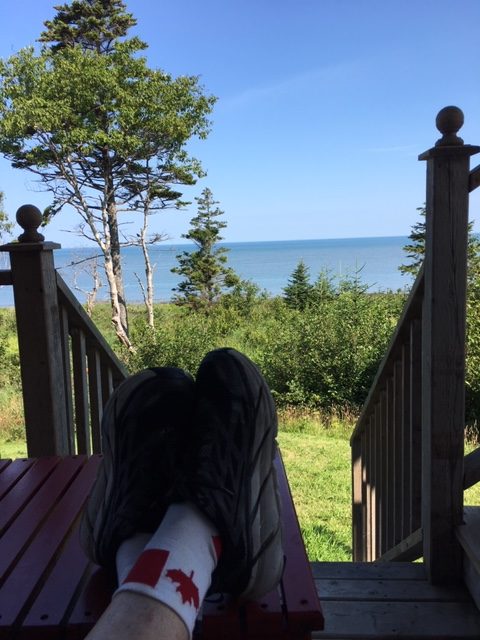As for many of us, the morning after I retired was a Saturday. It was a weekend, and besides I still had papers to grade. Then I had to pack for our summer up in Nova Scotia, and drive up, and settle in. (There’s unpacking, stocking the refrigerator, setting up my desk, checking on how the plants survived the winter, calling the neighbors. It takes several days – especially because there tends to be a lot of sitting on the porch and smelling the sea air.)
Then came the first Monday of our time in Nova Scotia, and I was ready to face retirement directly. I curled up in my favorite chair by the window and pulled out my journal. Across the top of the page, I wrote, “I have Retired. This is What Scares Me about It.” My heart started thudding in my chest, and my hands got shaky, but here’s what I wrote:
Retirement = a step towards old age. More creaky bones, more health problems, less energy, less mobility. Ugh.
Retirement = a step towards death. Double ugh.
Retirement = fading into the background, becoming peripheral, marginal, passe. I am no longer the English teacher or the Dean of Faculty. Other people have my jobs. (Yes, they’ll do them well. But still. . .) Even at my retirement party, I will be celebrated as the one who’s gone. It’s been such a big part of my identity for such a long time, and it will be weird living without it.
Retirement = being useless, or at least being perceived as useless. (Therefore, dismissed, ignored, treated as irrelevant and even incompetent.) I don’t want to be an object of pity or disgust. I’ve given up a job that I regard as socially valuable (and that other people regard that way, too). I was respected for doing that job well. I don’t want to be dismissed.
Retirement = being vulnerable. Work gave my husband and me a network of connections, of reasonably powerful and knowledgeable people to call on if we needed a referral to a good surgeon or financial planner.
Retirement = being bored. Teaching was fun most of the time. Now I’ll have to make my own fun, and I’m not always good at that.
Retirement = a lot of time at home, without work to keep my centered in my own life. Because of my upbringing and personality, I can easily lapse into becoming a satellite around a powerful personality – and it’s not good for me. How do I resist that?
Retirement = a lot of unstructured time. I now have to organize my schedule every single day. That’s a lot of decision-making. I will have to be more deliberate about carving out time for myself, paying attention to my own feelings, thinking my own thoughts.
Retirement = answering “I’m retired” when people ask what I do. It’s the absolute dullest answer in the world, the answer that sparks no questions and evokes no look of being impressed (not that being a high-school English teacher exactly impressed people…).
Retirement = not knowing what to do with myself, not knowing what to do with my time. Being at a loss and unhappy. Floundering.
And that was enough for one day. I snapped shut the journal and went for a bike-ride.
Other people’s lists would be different, I’m sure.
For one thing, no matter how many times people edging up to retirement try to reassure themselves by going over the financials (and over them and over them again), most of us experience a recurrent fear of poverty in old age. Women fear that they’ll wind up trapped in small, dingy apartments, isolated and eating cat food. Men and women alike have trouble banishing the fear of turning into sour-smelling hermits or bag ladies. We also fear we’ll wind up in nursing homes, wheeled in for tasteless meals, visited every few months by a pressured daughter or son, tended by aides who are grouchy, preoccupied, and careless. Except for the prospect of cat food or actual homelessness, these are reasonable fears for many people.
But even without the fear of poverty, retirement can look pretty scary. It’s the end of an era of our lives, the end of an identity most of us were proud of, a marker of old age, and a promise/threat of lots of unstructured time. We need to ease up to it, emotionally. We need to read and think about it before – or and after – we retire. We need to talk.
So I wonder, how did YOU ease up to it? Or did you just leap? And how is it working?
